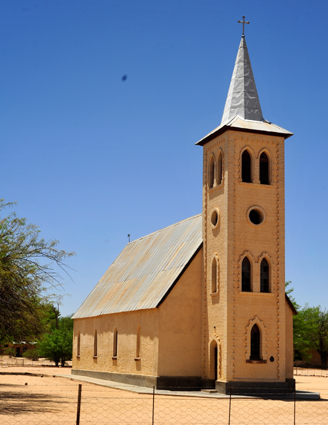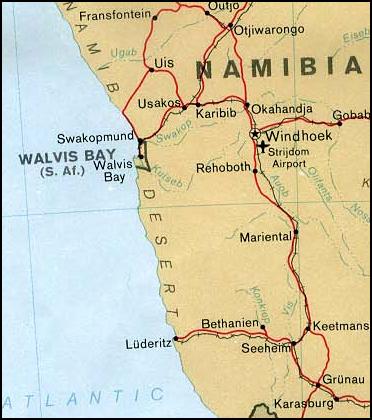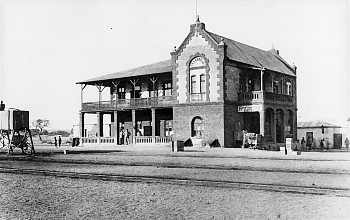|
Carl Hugo Hahn
Carl Hugo Hahn (1818–1895) was a Baltic German missionary and linguist who worked in South Africa and South-West Africa for most of his life. Together with Franz Heinrich Kleinschmidt, he set up the first Rhenish mission station to the Herero people in Gross Barmen. Hahn is known for his scientific work on the Herero language. Early life Hahn was born into a bourgeois family on 18 October 1818 in Ādaži (Aahof) near Riga in the Russian Empire. He studied Engineering at the Engineering School of the Russian Army from 1834 onwards but was not satisfied with that choice and, more generally, his parents' way of life. In 1837 he left Ādaži for Barmen (today part of Wuppertal, Germany) to apply at the missionary school of the Rhenish Missionary Society. He was admitted to the Missionary School in Elberfeld (also part of Wuppertal today) in 1838 and graduated in 1841. Missionary work Hahn arrived in Cape Town on 13 October 1841. His orders were to bring Christianity to the N ... [...More Info...] [...Related Items...] OR: [Wikipedia] [Google] [Baidu] |
Ādaži
Ādaži () (formerly german: Neuermühlen) is a town in Pierīga, on the left bank of the Gauja river. Town is administrative center of Ādaži Municipality. It is located by the highway A1 (Latvia), A1, 21.6 km from the center of Riga. Ādaži has administrative offices, schools (Ādaži Elementary School, Ādaži Secondary School, and Ādaži Free Waldorf School), Kindergarten Strautins, several shops (Maxima, Rimi, Elvi) and service companies. Latvia's longest river Gauja flows along the Ādaži River, and its tributary Vējupe divides town into two parts. Ādaži also has an eponymous wakeboarding club on the Gauja. The town is mostly known due to the nearby ''Latfood'' factory producing ''Ādažu Čipsi'', the best known potato chip brand in Latvia. History The castle of ''Neuermühlen'' has been documented since at least 1204. Here the Battle of Neuermühlen took place in 1492. After the battle the Bishop of Riga has to recognize the Teutonic Order as Overlord ... [...More Info...] [...Related Items...] OR: [Wikipedia] [Google] [Baidu] |
Ovamboland
Ovamboland, also referred to as Owamboland, was a Bantustan in South West Africa (present-day Namibia), intended by the apartheid government to be a self-governing homeland for the Ovambo people. The term originally referred to the parts of northern Namibia inhabited by the Ovambo ethnic group, namely the area controlled by the traditional Ovambo kingdoms in pre-colonial and early colonial times, such as Ondonga, Ongandjera, and Oukwanyama. Its endonym is ''Ovambo ~ Owambo''. Background In the 1960s South Africa, which was administering South West Africa under a League of Nations mandate, came under increased international pressure regarding its minority White rule over the majority of Blacks. The solution envisaged by South Africa—the Odendaal Plan—was to separate the white and the non-white population, grant self-government to the isolated black territories, and thus make Whites the majority population in the vast remainder of the country. Moreover it was envisag ... [...More Info...] [...Related Items...] OR: [Wikipedia] [Google] [Baidu] |
Walvis Bay
Walvis Bay ( en, lit. Whale Bay; af, Walvisbaai; ger, Walfischbucht or Walfischbai) is a city in Namibia and the name of the bay on which it lies. It is the second largest city in Namibia and the largest coastal city in the country. The city covers a total area of of land. The bay is a safe haven for sea vessels because of its natural deepwater harbour, protected by the Pelican Point sand spit, being the only natural harbour of any size along the country's coast. Being rich in plankton and marine life, these waters also drew large numbers of southern right whales, attracting whalers and fishing vessels. A succession of colonists developed the location and resources of this strategic harbour settlement. The harbour's value in relation to the sea route around the Cape of Good Hope had caught the attention of world powers since it was discovered by the outside world in 1485. This explains the complicated political status of Walvis Bay down the years. The town is situated j ... [...More Info...] [...Related Items...] OR: [Wikipedia] [Google] [Baidu] |
Otjimbingwe
Otjimbingwe (also: Otjimbingue) is a settlement in the Erongo Region of central Namibia. It has approximately 8,000 inhabitants. History The area was already a temporary settlement of some Herero in the early 18th century. Their chief Tjiponda coined the name ''Otjizingue'' ( hz, refreshing place, referring to the natural spring) from which the settlement's name developed. The Rhenish Mission Society used Otjimbingwe as a central location for their Namibian mission in 1849. Johannes Rath and his family settled in the area on 11 July that year. In 1854, copper was found in the nearby Khomas highlands and the Walwich Bay Mining Company established its offices in the city. Miners and merchants flocked to the settlement, and the researcher and businessman Karl Johan Andersson bought the entire settlement in 1860. He sold it five years later to the Rhenish Missionary Society. However the supply had been exhausted by that time, and the mining operations ceded. The settlement was a ... [...More Info...] [...Related Items...] OR: [Wikipedia] [Google] [Baidu] |
Alter Baiweg
{{disambiguation ...
Alter may refer to: * Alter (name), people named Alter * Alter (automobile) * Alter (crater), a lunar crater * Alter Channel, a Greek TV channel * Archbishop Alter High School, a Roman Catholic high school in Kettering, Ohio * ALTER, a command in older implementations of COBOL * Alter ego, or "alter" in popular usage, a "second self" * Alter (SQL) * ''Alter'' (album), 2002 album by Floater * ''Alter'', a 2006 remix album by Swiss band Knut * "Alter", a song from the 1994 album '' Glow'', by Raven See also * Altar (other) An altar is a religious structure for sacrifices or offerings. Altar may also refer to: Arts and entertainment * ''Altar'' (album), a 2006 album by Sunn O))) and Boris * Altar (Brazilian band), a dance music band * Altar (Dutch band), a death m ... [...More Info...] [...Related Items...] OR: [Wikipedia] [Google] [Baidu] |
Okahandja
Okahandja is a city of 24,100 inhabitants in Otjozondjupa Region, central Namibia, and the district capital of the Okahandja electoral constituency. It is known as the ''Garden Town of Namibia''. It is located 70 km north of Windhoek on the B1 road. It was founded around 1800, by two local groups, the Herero and the Nama. History Okahandja means ''the place where two rivers'' (Okakango and Okamita) ''flow into each other to form one wide one'' in Otjiherero. A German pastor, Heinrich Schmelen, became the first European to visit the town in 1827. In 1844, two missionaries were permanently assigned to the town, Heinrich Kleinschmidt and Hugo Hahn. A church dates from this period. A military post was established at the initiative of Theodor Leutwein in 1894, and it is this date that is officially recognized as the town's founding.Okahandja Hi ... [...More Info...] [...Related Items...] OR: [Wikipedia] [Google] [Baidu] |
Damaraland
Damaraland was a name given to the north-central part of what later became Namibia, inhabited by the Damaras. It was bounded roughly by Ovamboland in the north, the Namib Desert in the west, the Kalahari Desert in the east, and Windhoek in the south. In the 1970s the name Damaraland was revived for a bantustan in South West Africa (present-day Namibia), intended by the apartheid government to be a self-governing homeland for the Damara people. A centrally administered local government was created in 1980. The bantustan Damaraland was situated on the western edge of the territory that had been known as Damaraland in the 19th century. Damaraland, like other homelands in South West Africa, was abolished in May 1989 at the start of the transition to independence. The name Damaraland predates South African control of Namibia, and was described as "the central portion of German South West Africa" in the Encyclopædia Britannica Eleventh Edition. See also * Apartheid * B ... [...More Info...] [...Related Items...] OR: [Wikipedia] [Google] [Baidu] |
Wesleyan
Wesleyan theology, otherwise known as Wesleyan– Arminian theology, or Methodist theology, is a theological tradition in Protestant Christianity based upon the ministry of the 18th-century evangelical reformer brothers John Wesley and Charles Wesley. More broadly it refers to the theological system inferred from the various sermons (e.g. the Forty-four Sermons), theological treatises, letters, journals, diaries, hymns, and other spiritual writings of the Wesleys and their contemporary coadjutors such as John William Fletcher. In 1736, the Wesley brothers travelled to the Georgia colony in America as Christian missionaries; they left rather disheartened at what they saw. Both of them subsequently had "religious experiences", especially John in 1738, being greatly influenced by the Moravian Christians. They began to organize a renewal movement within the Church of England to focus on personal faith and holiness. John Wesley took Protestant churches to task over the nature of ... [...More Info...] [...Related Items...] OR: [Wikipedia] [Google] [Baidu] |
Oorlam
The Oorlam or Orlam people (also known as Orlaam, Oorlammers, Oerlams, or Orlamse Hottentots) are a subtribe of the Nama people, largely assimilated after their migration from the Cape Colony (today, part of South Africa) to Namaqualand and Damaraland (now in Namibia). Oorlam clans were originally formed from mixed-race descendants of indigenous Khoikhoi, Europeans and slaves from Mozambique, Madagascar, India, and Indonesia. Similar to the other Afrikaans-speaking group at the time, the Trekboers, Oorlam originally populated the frontiers of the infant Cape Colony, later living as semi-nomadic commandos of mounted gunmen. Also like the Boers, they migrated inland from the Cape, and established several states in what are now South Africa and Namibia. The Oorlam migration in South Africa also produced the related Griqua people. History Beginning in the late 18th century, Oorlam communities migrated from the Cape Colony north to Namaqualand. They settled places earlier ... [...More Info...] [...Related Items...] OR: [Wikipedia] [Google] [Baidu] |
Tribal Chief
A tribal chief or chieftain is the leader of a tribal society or chiefdom. Tribe The concept of tribe is a broadly applied concept, based on tribal concepts of societies of western Afroeurasia. Tribal societies are sometimes categorized as an intermediate stage between the band society of the Paleolithic stage and civilization with centralized, super-regional government based in cities. Anthropologist Elman Service distinguishes two stages of tribal societies: simple societies organized by limited instances of social rank and prestige, and more stratified societies led by chieftains or tribal kings ( chiefdoms). Stratified tribal societies led by tribal kings are thought to have flourished from the Neolithic stage into the Iron Age, albeit in competition with urban civilisations and empires beginning in the Bronze Age. In the case of tribal societies of indigenous peoples existing within larger colonial and post-colonial states, tribal chiefs may represent their tribe or ... [...More Info...] [...Related Items...] OR: [Wikipedia] [Google] [Baidu] |
Jonker Afrikaner
Jonker Afrikaner ( 1785, ''Roode Zand'' near Tulbagh, South Africa – 18 August 1861, Okahandja) was the fourth Captain of the Orlam in South West Africa, succeeding his father, Jager Afrikaner, in 1823. Soon after becoming ''Kaptein'', he left his father's settlement at Blydeverwacht with three brothers and some 300 followers and relocated to the area that is today central Namibia. From 1825 onwards he and his council played a dominant political role in Damaraland and Namaland, creating a ''de facto'' state. Around 1840, he established a settlement at Windhoek where he built a church for a congregation of between 500 and 600 in the area of the present-day Klein Windhoek suburb. He is further known for his road building activities in central and southern Namibia, particularly the one over the Auas Mountains to the south and the northern Bay Road from Windhoek to Walvis Bay Walvis Bay ( en, lit. Whale Bay; af, Walvisbaai; ger, Walfischbucht or Walfischbai) is a ... [...More Info...] [...Related Items...] OR: [Wikipedia] [Google] [Baidu] |










